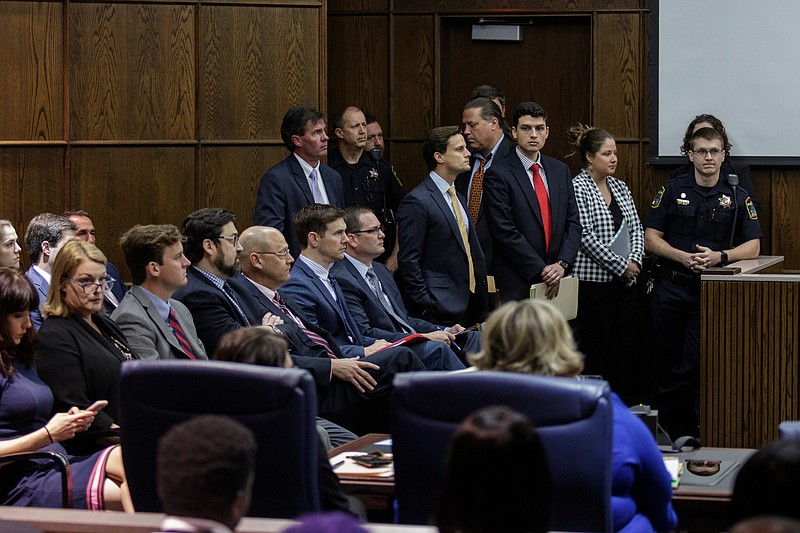Death threats and a handful of evidence leaks in a 55-person gang racketeering conspiracy case have Hamilton County prosecutors making an unusual request of criminal defense attorneys.
In order to get certain pieces of sealed evidence, prosecutors said in an email last week, defense attorneys and their clients need to sign confidentiality agreements promising not to distribute any of it. If defense attorneys want to leave documents with clients for them to review, a common practice for those in custody, they must first redact specific information themselves.
The confidentiality agreements come on the heels of two significant leaks in the state's case, which charges eight alleged Athens Park Bloods members in six previously unsolved murders and roughly 40 others with committing past crimes on the street gang's behalf. In October, someone posted documents on Facebook that showed people speaking to the Federal Bureau of Investigation about the Athens Park Bloods. And in January, a 2014 interview leaked in which Chattanooga police detectives could be heard trying to convince a man in a rival group to become an informant and arrange a setup.
So far, one defense attorney has signed the agreement, while a number of others have expressed concerns. Some said they were concerned that signing it could land them in legal trouble if they miss something in their redactions, or if their client tells somebody else the information and it ends up on Facebook anyway. Others who are solo practitioners have filed motions saying they won't have the time or resources to print and then redact thousands of pages.
Confidentiality agreements and protective orders are common in civil cases, particularly with companies that don't want to publicize their trade secrets. For example, attorneys for private prison operator CoreCivic often ask opposing lawyers in wrongful death or medical negligence lawsuits to sign orders that seal sensitive information about the company's jail and prison workings.
Chattanooga defense attorney Jonathan Turner, who's been approached by other lawyers on the racketeering case about the issue, said criminal defendants have stronger individual legal and evidence rights than plaintiffs in civil cases. He said the agreements could deprive a defendant of their constitutional right to assistance of counsel if attorneys go back and forth on what they can share with clients, or drop off of a case because of it.
Melydia Clewell, a spokeswoman for local prosecutors, said District Attorney General Neal Pinkston cannot comment on a pending case. Earlier this week, Criminal Court Judge Tom Greenholtz suggested attorneys can seek personalized agreements with the prosecution. In the meantime, defendants and defense attorneys do not have access to the sealed material, which is only a fraction of the potential evidence.
For this case, prosecutors are relying on hundreds of hours of jailhouse phone calls, years of social media posts, law enforcement interviews and investigative files, and confidential informants and other witnesses. And since fall, prosecutors have been asking defense attorneys to bring an external hard drive to their office on Market Street to dump a terabyte of information onto it. A terabyte is at least 1,000 gigabytes, which could translate to hundreds of thousands of documents.
The redactions in the agreement include a number of things: Social Security and bank account numbers, the names of anyone other than the intended defendant, medical information, and references to a handful of sensitive law enforcement reports and interviews.
There are serious safety reasons for this. Witnesses in a normal prosecution can flip or recant their testimony, and the odds of that happening increase if witnesses believe they're going to be harmed. That's happened before with the Athens Park Bloods in Hamilton County: A witness who previously identified alleged member Cortez Sims as the gunman in a 2015 quadruple shooting refused to testify against him at trial in April 2017.
In this racketeering case, three men face death penalty notices, if convicted, for kidnapping and murdering state's witness Bianca Horton in 2016 to prevent her from testifying against Sims for that shooting.
Contact staff writer Zack Peterson at zpeterson@timesfreepress.com or 423-757-6347. Follow him on Twitter @zackpeterson918.
